 Petzlover
Petzlover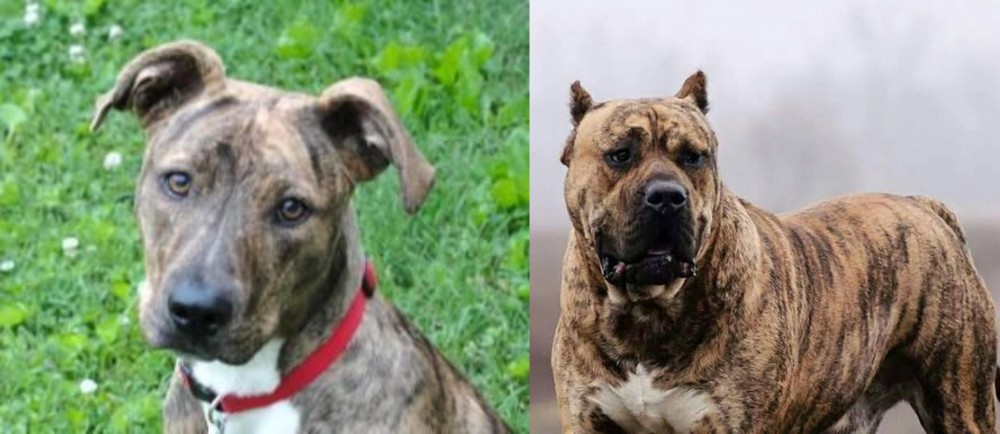 Mountain Cur is originated from United States but Perro de Presa Canario is originated from Spain. Both Mountain Cur and Perro de Presa Canario are of same height. Mountain Cur may weigh 43 kg / 94 pounds lesser than Perro de Presa Canario. Mountain Cur may live 4 years more than Perro de Presa Canario. Both Mountain Cur and Perro de Presa Canario has almost same litter size. Both Mountain Cur and Perro de Presa Canario requires Low Maintenance.
Mountain Cur is originated from United States but Perro de Presa Canario is originated from Spain. Both Mountain Cur and Perro de Presa Canario are of same height. Mountain Cur may weigh 43 kg / 94 pounds lesser than Perro de Presa Canario. Mountain Cur may live 4 years more than Perro de Presa Canario. Both Mountain Cur and Perro de Presa Canario has almost same litter size. Both Mountain Cur and Perro de Presa Canario requires Low Maintenance.
 From The United States in the hound group comes the Mountain Cur. This breed was developed especially to “tree” their prey and to trail other smaller game. They treed and bayed larger prey like the wild boar and bears in the mountains and they trailed the smaller ones like the raccoon and squirrel. There are many types of curs and this breed is just one. Curs can be water dogs, farm dogs, hunting dogs and guard dogs. However, they are not great family dogs because they were born to hunt.
From The United States in the hound group comes the Mountain Cur. This breed was developed especially to “tree” their prey and to trail other smaller game. They treed and bayed larger prey like the wild boar and bears in the mountains and they trailed the smaller ones like the raccoon and squirrel. There are many types of curs and this breed is just one. Curs can be water dogs, farm dogs, hunting dogs and guard dogs. However, they are not great family dogs because they were born to hunt.
The Mountain Cur comes out of Kentucky, Tennessee, Ohio and Virginia. The ancestors of the American Mountain Cur came with European settlers almost 200 years ago. They worked with the settlers to hunt for animals that would provide them with pelts and meat in order to survive on the frontier. The breed became rare when the descendants of the settlers moved to the factories after the second world war.
The breed was brought back by four ambitious men who saved the Mountain Cur. They form the Original Mountain Cur Breeder’s Association of OMCBA in 1956. But they argued over the standard and 2 of the 4 left to form their own association: The Stephen Stock Mountain Cur Association. By 1957 the Mountain Cur Breeder’s Association formed but it took until 1998 for the Mountain Cur to be registered with the United Kennel Club.
The Mountain Cur is a tough, courageous dog as are all the Curs. They are willing to face large and ferocious prey. They are fearless watch dogs, using their trait of being quiet on the hunt to their advantage. The Mountain Cur wants nothing more than making you happy. They have been known to corner bears and even bulls. Given the independence and intelligence of the Mountain Cur it is important that the human be the pack leader, or the Cur will assume the role. If angry the Cur will growl and bite, so being the pack leader is vital for humans.
The novel “Old Yeller” was written about a Mountain Cur – a yellow shorthaired dog with a bobbed tail and terrier blood. Like all Mountain Curs “Old Yeller” hunted and treed prey, fought a bear and held onto the nose of a charging bull. The Cur was the first American purebred dog. Other early lines come from the Appalachian Mountains and near them in southern states. Mixing hounds and terriers created this tough, courageous dog whose tenacity and grit are second to none. Today the Mountain Cur has been split into four distinct breeds: the Mountain Cur, The Mountain View Cur, the Stephens Stock, and the Treeing Tennessee Brindle.
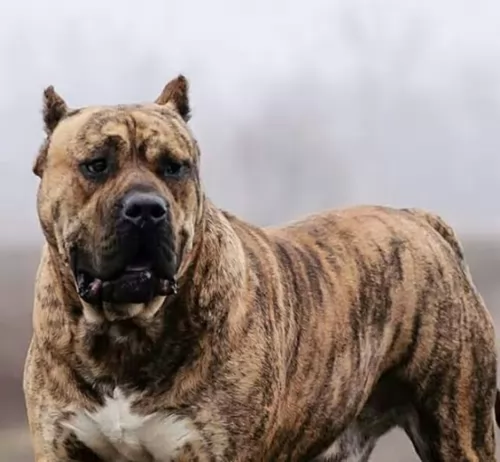 This large dog, also known as the Canary Mastiff, is a rare Molosser-type dog hailing from the Canary Islands.
This large dog, also known as the Canary Mastiff, is a rare Molosser-type dog hailing from the Canary Islands.
It does appear as if, according to records, that these dogs were also consumed at one time. The dog has also been used as a cattle dog as well as being used for dog fighting till the middle of the 1900s. Dog fighting was prohibited in the 1940s but it continued for a number of decades.
As people became interested in other dog breeds, the Presa nearly died out but some breeders revived the breed because of it having some good characteristics – territorial, brave, protective and intelligent. The FCI recognized the dog in 2011.
 Bred to be a hard working hunter and protector, the Mountain Cur is rugged and stocky. They are muscular with strong neck, wide head and expressive dark brown eyes. Some may have blue or green eyes, but they will be darker instead of light. They have a heavy muzzle, high set short ears and feet that are catlike, muscular and strong. The Cur has straight legs, deep chests and 50% are born with the tail bobbed.
Bred to be a hard working hunter and protector, the Mountain Cur is rugged and stocky. They are muscular with strong neck, wide head and expressive dark brown eyes. Some may have blue or green eyes, but they will be darker instead of light. They have a heavy muzzle, high set short ears and feet that are catlike, muscular and strong. The Cur has straight legs, deep chests and 50% are born with the tail bobbed.
Their coat is short and heavy. The colors could be yellow, red, blue, brindle, black and brindle, yellow with white points, dark brown and red.
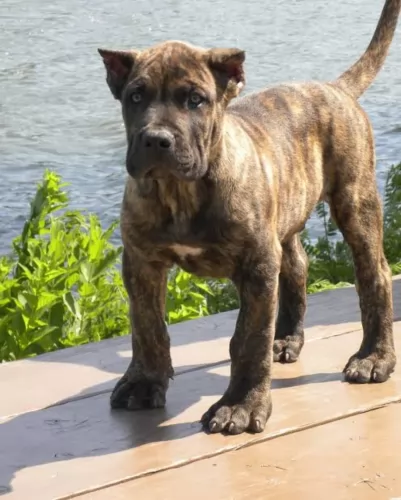 The Perro de Presa Canario or Canary Dog is large and muscular. He stands at 58 to 66cm in height and weighs anything from 40 – 70kg. He has a deep bark.
The Perro de Presa Canario or Canary Dog is large and muscular. He stands at 58 to 66cm in height and weighs anything from 40 – 70kg. He has a deep bark.
The head is broad and the ears are normally cropped to give him a more aggressive appearance. With ear cropping being banned the ears are close fitting to the head and are floppy. This is one of those dogs where the rear of the dog is slightly higher than the shoulders.
The coat is short and there is no undercoating. It is available in all different shades of fawn and brindle. The breed standard requires the dog having a black mask.
Canine experts tell us that this large working dog has got such fearless guardian characteristics that they wouldn’t recommend this dog for first time dog owners. On the other hand however, there are dog owners who claim that with good socialization, this dog becomes docile and amicable around their human family.
He is a clever dog so training and socialization will be easy and it will be worth it. This is a dog noted for its strength, it’s strong personality and potential for aggression, so training and socialization will be most important.
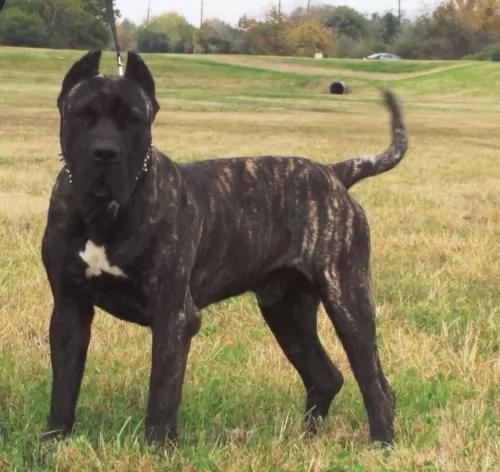 Contrary to what many people think, the Perro de Presa Canario can be a calm, gentle dog when trained and socialized properly.
Contrary to what many people think, the Perro de Presa Canario can be a calm, gentle dog when trained and socialized properly.
It is only when you bring an older, unknown dog into your midst that you would have to exercise caution with him as he can then be aggressive.
Dogs become dangerous and aggressive when they are brought up by aggressive, uncaring people. Humans are always to blame for the way a dog turns out. Provide this large dog with a loving, caring home, and he’ll show you what a remarkable pet he can be.
 There are a few health issues that the Mountain Cur is susceptible to. They include:
There are a few health issues that the Mountain Cur is susceptible to. They include:
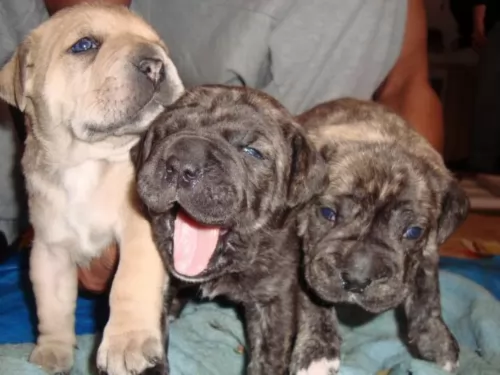 The Perro de Presa Canario can live to be between 8 and 12 years of age. Being a large breed the dog can be susceptible to hip dysplasia and other problems such as cancer and heart problems. It is highly unlikely that a well cared for dog will get any of these illnesses.
The Perro de Presa Canario can live to be between 8 and 12 years of age. Being a large breed the dog can be susceptible to hip dysplasia and other problems such as cancer and heart problems. It is highly unlikely that a well cared for dog will get any of these illnesses.
It is far better to give your dog two smaller meals a day as opposed to one bigger meal as then he tends to wolf his food down. This can lead to bloat, where the stomach swells up and worse, it twists. This dangerous situation prevents fluid and air from escaping the stomach. Your dog is restless, he paces and salivates, wanting to vomit. Bloat can affect any dog at any age.
Kidney disease can develop because of some other illness or it can develop on its own. It can even be caused by bad teeth when bacteria enters the bloodstream of the dog.
 Mountain Cure puppies should eat four bowls of high quality dog food in four separate meals each day until 3 months old. From three months to six months feed them 3 times per day and from six months to a year just twice a day.
Mountain Cure puppies should eat four bowls of high quality dog food in four separate meals each day until 3 months old. From three months to six months feed them 3 times per day and from six months to a year just twice a day.
The adult Mountain Cur would eat 3 cups of high quality dog food in one or two meals per day. Don’t overfeed them as they have a tendency toward obesity.
Athleticism
This breed is an active dog and he needs to get plenty of exercise. He needs daily exercise – daily walks – and enjoys canine sports like barn hunt and agility. They do well in field trials.
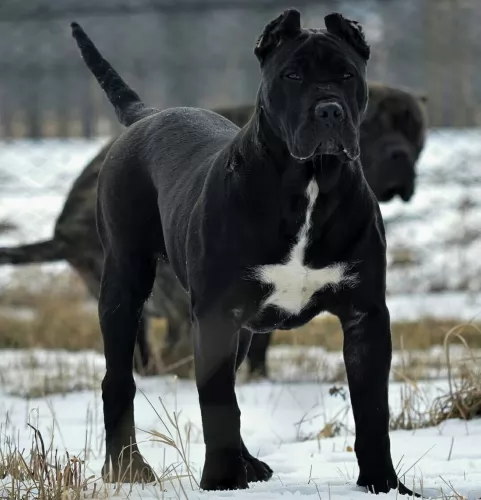 This is a short haired dog, and he isn't a heavy shedder so beyond regular twice-a-week brushing he will simply need to have his eyes and ears checked for infections.
This is a short haired dog, and he isn't a heavy shedder so beyond regular twice-a-week brushing he will simply need to have his eyes and ears checked for infections.
He will also need to have his nails clipped and to check his teeth over too. A sore, bad tooth at the back of your pet’s mouth can cause terrible pain but also play havoc with his general health.
Your Perro de Presa Canario is a high-energy dog and he will need daily exercise. He will love a good walk but he will also need something more strenuous and demanding such as ball- and rope tug-of-war games.
Try and provide your large pet with a top quality commercially manufactured food – one that is packed with vitamins and minerals instead of colorants preservatives and toxic fillers.
Break the monotony of feeding him only kibble by mixing in some cooked chicken, brown rice, sweet potato, carrots and spinach. Dogs love consistency and simplicity and simple meals like this with some raw meat thrown in occasionally will keep him healthy and happy. Never leave him without a constant supply of fresh, cool water.